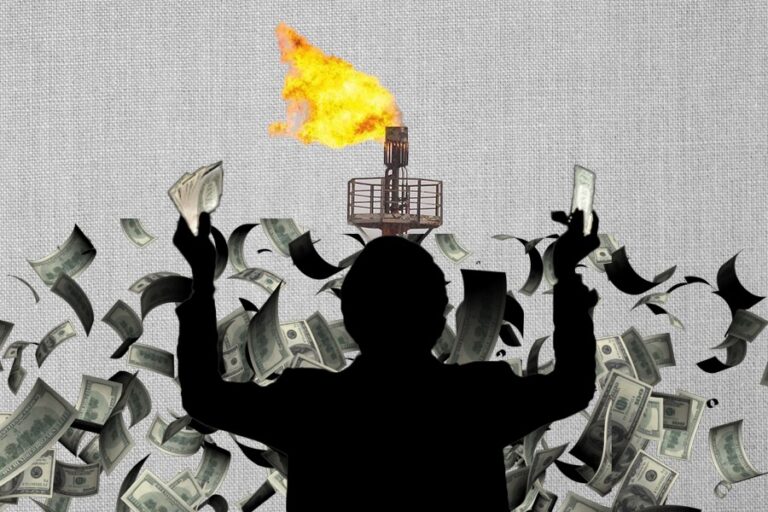Numerous promises have been made by successive governments since 2003 to this day regarding the investment of associated gas, which oil extraction processes have burned 629 billion cubic feet of. However, the government of Prime Minister Mohammed Shia al-Sudani appears serious about resolving this long-neglected and complex issue.
After signing a memorandum of understanding with Siemens and Schlumberger, and with the recent involvement of the United States in the investment of Iraqi gas, the Ministry of Oil announced on Wednesday that it has signed a contract with the Ukrainian company Ukrzem Resource to develop the Akkas gas field at a rate of 400 million standard cubic feet per day.
Despite being one of the leading oil-producing countries in the Middle East, Iraq suffers from a chronic gas shortage. It imports about 50 million cubic meters of gas daily from Iran through a network of pipelines in the east and south of the country, built to supply Iraqi gas-fired power plants.
During a ceremony overseen by Oil Minister Hayan Abdul Ghani, between the ministry represented by the Central Oil Company, the Northern Oil Company, and the Directorate of Petroleum Contracts and Licenses, and Ukrzem Resource, the minister emphasized the necessity of developing the Akkas gas field in Anbar province. This development aims to add 400 million standard cubic feet per day to the national production to supply new quantities of natural gas to power generation plants.
The minister, in a statement obtained by “The New World,” noted that the Central Oil Company had previously managed to operate the field within an accelerated plan to supply the Akkas gas plant with 60 million standard cubic feet per day.
He mentioned that the contract with the Ukrainian company aims to reach a production rate of 100 million standard cubic feet per day in the first phase (1-2 years), and 400 million standard cubic feet per day within four years.
Deputy Minister for Extraction Affairs, Basim Mohammad Khudair, said according to the statement, “This contract was achieved after many years of waiting due to the war on terrorist gangs,” noting that “the contract’s formula with the Ukrainian company aims to start initial production ranging from a year and a half to two years, aiming to increase the field’s production rates to 100 million standard cubic feet per day, and to 400 million standard cubic feet within four years, which will feed the Anbar power station and Akkas gas plant.”
Meanwhile, Mohammad Yasin Hassan, General Manager of the Central Oil Company, stated, “Today we witnessed the Korean company Kogaz handing over to the Ukrainian company to execute and invest in the Akkas field project, which represents an important step towards investing in gas, especially in the western region due to its large gas reserves. We are working to optimally exploit this to enhance the national network with new gas energy that contributes to supporting Iraq’s energy sector and boosting national production.”
The United States signed two agreements with Iraq aimed at reducing the burning of highly polluting and wasted gas on April 15, during Prime Minister Mohammed Shia al-Sudani’s visit to Washington for talks with President Joe Biden.
On March 31, the Oil Ministry announced the signing of a memorandum of understanding with Siemens and Schlumberger regarding investments in the gas sector.
Gas flaring occurs when fossil fuel companies burn off excess methane from oil operations instead of storing it in pipelines. When burned, this potent greenhouse gas, which is 80 times more impactful on global warming than carbon dioxide over a 20-year period, is released into the atmosphere. After Russia, Iraq ranks second globally in the highest levels of gas flaring.
Flaring also releases toxic pollutants known to harm human health, including benzene, a human carcinogen that can cause leukemia.
Iraq agreed with Iran to extend two gas purchase contracts for five years, according to statements reported by the Mehr Agency from Iranian Oil Minister Javad Owji.
In November 2023, Mazhar Mohammed Saleh, an advisor to the Iraqi Prime Minister, estimated the losses from gas flaring and imports at $12 billion annually, noting it as a substantial cost to the country’s oil resources and financial resources.
Iraq’s natural gas reserves are estimated at 132 trillion cubic feet, according to the Organization of Petroleum Exporting Countries (OPEC), with 700 billion cubic feet burned off due to a lack of exploitation capacity. The daily production of associated natural gas is 2.7 billion cubic feet, targeting an increase to 3.1 billion cubic feet. It accounts for 1.5% of OPEC’s global reserves and 1.8% of the global reserve, ranking 11th internationally.





